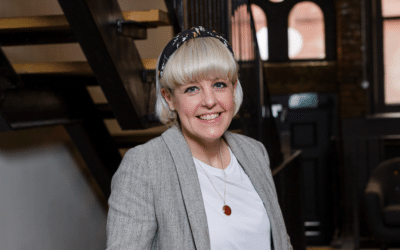A Digital is a digital agency based in Kendal.
The agency’s managing director and founder, Andrew Armitage, is a specialist who has spent more than 20 years creating digital platforms for market leaders.
Setting up the agency from a spare bedroom back in 2009, the agency now has a team working with clients including the NHS, Hawkshead Relish and Windermere Lake Cruises.
Armitage is also a podcast host and the author of an Amazon best seller on digital transformation.
Here, he shared his career journey and some valuable pearls of wisdom…
How did you first get into your industry?
To be honest, I found my own way into the industry through a fascination with the Internet and the ability to create something and build on it with simple changes to HTML code. The timing was just right; the internet was going mainstream right at the start of my career. I completed a Business degree at UCLAN that included a website module and was then given a website build task during my placement year.
However, this seemingly cut and dry journey into a career where the web was central was cut short after I joined BAE Systems on its graduate scheme. Then followed it with two years as an area manager at Aldi. There simply wasn’t a lot of opportunity, or scope, in either role to work with the web.
It was only when I left Aldi that I rediscovered my passion for technology via – funnily enough – books and a job with a company that sold websites. It was there I realised that companies were missing a trick – they were simply being sold a new website and there was no explanation of how they could truly reap the benefits this window into their brand could provide. I felt there must have been a better way.
I applied for local jobs, but got no replies so literally walked the streets introducing myself to B&Bs in the Lake District which led to three small projects. And then a stand at the hospitality exhibition helped secure a host of new clients, and then my web business became ‘official’ and a reality.
What do you love about your job?
Leading a team and seeing them working well together is hugely rewarding. It gives me a buzz when there’s a joint feeling of excitement when projects are progressing, and then seeing things come together.
I always enjoy meeting new businesses and seeing the range of challenges people have. Then guiding and helping them with new ideas and solutions that can improve their business or make their lives easier. Seeing the positive reactions to a new website, or the results it has achieved for them, is still really special.
I have a love of the creative aspect of the role. And feel strongly that great technical solutions need to be matched with great design. I’d also be lying if I didn’t love the opportunity to play with tech gadgets and fancy cameras!
Who – or what – has inspired you in your career?
In some cases it was the authors of some of the early books I read – the likes of Andy Budd, Jeremy Keith and Andy Clarke. I was hearing them speak at conferences and seeing that they were travelling the world and writing books. I never imagined I’d have some of those opportunities as well.
On a personal level, I was always inspired by Dad who also ran his own business and was very successful with it. My sister is also self-employed, so it definitely runs in the family. As the years have gone on it’s become my own family that inspires me to support them and create opportunities for us, especially my daughters seeing them grow up.
What are the biggest challenges about your job?
We’re solving problems that in most cases are people problems. From how to get more people to your website or to buy from you, to how to answer or solve customer’s problems. Added to that is the technical aspect of our work. We’re living in an age where it’s never been easier to build a website, but at the same time, it’s never been harder!
Whether it’s the exponential evolution of technology, the introduction of new platforms such as GA4 or the end of third-party cookies, this increasingly digital world – ironically – throws up several challenges that are not always easy to solve with off the shelf software. We now face the explosive growth of AI, but despite the excitement, there are plenty of opinions suggesting human interaction will become more important than ever.
While I see the advantages of AI, it’s important we don’t become slaves to content and ideas simply plucked from across the internet that human judgement and personality. There’s also an increasing need for websites to link up with third party systems and services. Platforms such as Zapier make it easy to do the basics, but beyond this it can become really complex quite quickly.
Leading a team is always challenging. Every business owner or MD has some questions if they are actually any good at managing people or if they are doing enough. My solution is simply trying my best and being committed to always listening and learning.
What skills have been the most crucial to you succeeding in your career so far?
Creative thinking, listening, diplomacy and compromise are key to successful client relationships and leading your team. Sensitive leadership with the team is important. Having empathy and a clear understanding of what I’m asking others to do is important to me. After all, I was always taught never to expect someone to do a job you’ve not done – or wouldn’t do yourself. I’m hugely conscientious and always willing to listen and learn how to improve.
What was your first salary and what could someone getting into the industry expect to earn nowadays?
In my university placement year, my salary was a mere £12,500. This rose to about £20k in my first graduate role. An entry level salary for a web developer or designer is roughly around £25k, but it depends on where you live and what industry you work in.
Salaries in our industry have been on the rise, but I don’t always think the skills have kept pace with the expectations some people have. There will be a reset soon with the economic challenges we find ourselves in, but also the impact of new technology.
AI will take over some of the more admin-heavy tasks we all do in our jobs and render some skills less valuable, and I fear web development will fall into that category over the coming years. The skill won’t be in writing code necessarily, but knowing how to approach a project and understand what AI is doing behind the scenes. The regular activity or task will be led by AI, while more complex bespoke coding (and support) will still be needed, as will interpreting the code when it almost inevitably breaks.
There are so many tools and tutorials that exist online that didn’t exist when I started in the industry. So, while skills are important, I’m always looking out for the right attitude and aptitude in a person. The soft skills of being able to work with clients and colleagues along with a willingness to learn are valuable attributes, especially for agencies looking to bring in new talent to support their growth.
What education or training would be most useful for someone looking to follow your career path?
As a small team, we need people to hit the ground running, but we’re more than happy to make the investment with training and support – but it needs to be reciprocated. I’m hesitant to say qualifications matter because often technical courses (particularly at degree level) are sometimes 2-3 years behind where we are commercially. A degree says a lot about the person as well as their qualification and of course, there are more options for training and self-study these days.
Soft skills should not be overlooked beyond coding or design abilities. People buy from people and we’re in a relationships business. Added to this is confidence in presenting and challenging ideas, speaking up in a team and offering support to your colleagues all contribute to the ‘fit’. Demonstrating your enthusiasm and willingness to learn and develop your skills (sometimes in your own time) I think is also a reasonable expectation.
What advice would you have for someone looking to follow your path?
It’s said so many times it becomes a little clichéd, but you need a passion for what you do and to make a difference to the people you serve. Always be open to learn new skills – training needs to be supplemented by your own enthusiasm to develop your skills, so embrace the power of lifelong learning.
Then help yourself to stand out – build a personal brand (which should really be taught in schools) and be prepared to do some of this in your own time. This is vital if you want to start a business, as is building a network and having confidence in your ability.
Don’t be afraid of hard work, the knock backs and the failures – they will all help your career and define you as a leader. They may seem harsh at the time, but don’t spend time ‘sweating the small stuff’. But do take time to celebrate the wins. Finally, if you don’t ask you don’t get – have ambition, but don’t try to boil the ocean.











